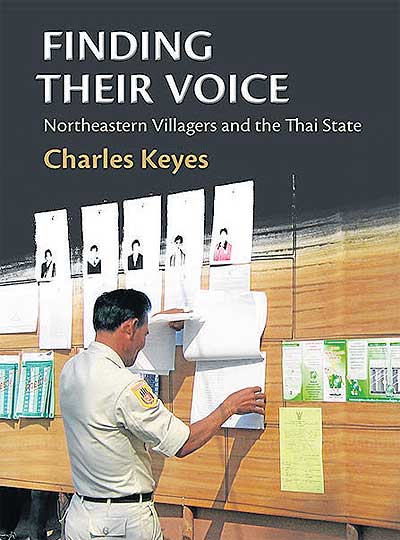Why have Northeasterners become such enthusiastic supporters for Thaksin Shinawatra, the Pheu Thai party and the red-shirt movement? Charles Keyes first arrived in the Northeast in 1962 as a research student in rural anthropology. After the 2010 crackdown on red shirts in Bangkok, he realised he had to rethink all he had learned and written about the region over the last 48 years. This book is the result.

Finding Their Voice: Northeastern Villagers And The Thai State by Charles Keyes Silkworm Books, Chiang Mai ISBN 978-616-215-074-6, 650 baht
Keyes tells the story from the micro-viewpoint of the village and the macro-level of the region. The Maha Sarakham village he first studied in the 1960s was almost self-sufficient, very isolated, poor in material terms, bound in the little world of kinfolk, the village temple and the annual rice-growing cycle.
Its transformation has been overwhelming. From the 1960s, villagers enthusiastically embraced the national project of “development”. At first they diversified into many new commercial crops. Before long they found migration for work to be a better strategy — to Bangkok, Saudi Arabia, Taiwan, anywhere. Now almost every adult, male and female, works outside the village for some period. With the money, families have built urban-style houses, connected to the world through television and the internet, and switched to urban consumption patterns. Shops and service businesses have popped up along the village street to service this demand, giving the place an urbanised air. Keyes says the people are now “cosmopolitan villagers”. Their way of life, horizons and values have utterly changed with mobility and globalisation. But they also remain villagers, retaining links to their families, donating money to renovate the village temple and often hoping to return for retirement. They still think of themselves as chao ban (villagers).
The first northeastern migrants in the 1960s discovered that people in Bangkok looked down on them, regarding them as backward and stupid. The sense of injury at this discovery is a theme of the songs from that era. Despite the massive transformation of the region in the 50 years since, these views persist. In 2009, a Bangkok university professor called Northeasterners the “ignorant poor” and “stupid”, incapable of being anything better than petrol station attendants. Yellow-shirt protesters held up signs calling them “buffaloes”. The same views have been repeatedly voiced from protest stages over recent months. Bangkokians are revealing their own ignorance about their own country. That selfsame sense of injury, of course, now cuts even deeper.
The macro of Keyes’ story traces the truculent history of Isan, the name of Siam’s Northeast in the late 19th century.
In early years, the region was a refuge for people fleeing the rule of Lao kings. After the region was captured by Siam and submitted to a new form of centralised government in the late 19th century, rebels promised to throw out these new rulers and usher in a utopian age. When parliaments were introduced after 1932, northeastern MPs spearheaded opposition to rule by generals and domination by Bangkok. Several were murdered.
From the 1960s, government worried that communism would flow into the northeast from Laos and Vietnam. To counter this “Isan problem”, the government stepped up both development and surveillance. The arrival of more police, local officials and development workers in Isan meant more instances of petty oppression. Keyes argues that communism failed to profit from the resulting resentment because the imported Maoist variant never adjusted to the values and concerns of the local population.
After the Cold War ended, the Northeast became another battlefield between the state and the local people over control of natural resources, especially forests and rivers. Keyes suggests that villagers rejected schemes like the Pak Mun Dam because they represented “an elitist and urban-centred approach to development” at odds with the villagers’ concept of development “shaped by their Buddhist-derived ideas of moral community”.
In 1967, Keyes wrote Isan: Regionalism In Northeastern Thailand, which is now considered a classic of its era. Here he updates the story but leaves its core message unchanged. Through flight, revolt, parliamentary activism, environmental campaigns and street protests, Isan people have simply been struggling for a fairer deal from the state. As their experience and horizons have widened, the meaning of ban hao, “our home”, has broadened from the village to the region. Keyes now uses the term “ethnoregionalism”, referring to the newly cultivated sense of Isan as a region with a distinct history, culture and politics.
Since 2000, Isan people have discovered the power of the vote to achieve their desire for a fairer deal. Thaksin may not be the perfect leader for their aspirations, as he is neither a native of the region nor a good representative of the Buddhist morality which, Keyes argues, underlies the Isan people’s conception of fairness. But politics is the art of the possible, of choosing between the available alternatives. When Thaksin was overthrown, Northeasterners spearheaded the biggest mass movement in Thai political history as a continuation of “their quest to have a voice in a democratic polity”.
Keyes concludes by arguing that the political assertiveness of Isan is part of Thailand’s transformation “into a pluralist polity in which diverse interests are accommodated through a democratic system” and that Northeasterners “will continue to play a major role in the reshaping of the Thai polity to accommodate all citizens in the country”.
In the few months since this book was written, Thai politics has done another somersault. These ructions will continue. This book charts the social and intellectual changes underlying one major element of this turbulence, and is thus necessary reading for understanding current and near future Thai politics.

